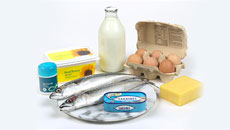New studies have shown how important it is for pregnant women to have optimal blood levels of vitamin D to help lower the risk of their babies developing multiple sclerosis and autism.
A newly published study in Neurology from Danish researchers has found that babies born within the lowest quintile of vitamin D levels had twice the risk for future multiple sclerosis (MS) as infants born in the highest quintile. This led the researchers to conclude that low concentrations of neonatal vitamin D are associated with an increased risk of MS.
Adding further support for increased vitamin D supplementation for pregnant women is a new study published in Molecular Psychiatry on autism. The large population-based cohort of mothers and their children found that gestational vitamin D deficiency was associated with an increase in autism-related traits in 6-year-old children linking gestational vitamin D deficiency and altered brain development.
Dr. Reinhold Vieth, Scientific Advisor for the Vitamin D Society and retired professor at the University of Toronto, says that in addition to lowering the risk of developing multiple sclerosis and autism, a clinical trial now shows that risk of premature birth is lower if American women raise their blood vitamin D levels that match amounts that are naturally present in the blood of women living in the tropics.
“Getting vitamin D levels of pregnant women that are ‘natural for human beings’ will have a beneficial effect on infant health that will last a lifetime,” says Dr. Vieth.
Vitamin D scientists recommend that everyone including pregnant women reach a vitamin D blood level of between 100-150 nmol/L. Pregnant Canadian women, especially through winter, should consider taking up to 4,000 IU/d of vitamin D3 supplement for the best health of their future baby. You should test your 25(OH)D blood level after 3 months and see if the 100 nmol/L level has been achieved. If not adjust your dosage.
The Institute of Medicine (IOM) and Health Canada have recommended that the tolerable upper intake level (UL) of vitamin D for pregnant women is 4,000 IU/d. This represents the maximum daily intake that is unlikely to cause adverse health effects. Previous randomized controlled trial studies have proved the safety and effectiveness of pregnant women taking 4,000 IU of vitamin D3 supplementation per day.
“This new research adds valuable scientific evidence proving the importance for pregnant women to have optimal vitamin D levels between 100-150 nmol/L for the health of their new infant,” says Perry Holman, Executive Director of the Vitamin D Society.






